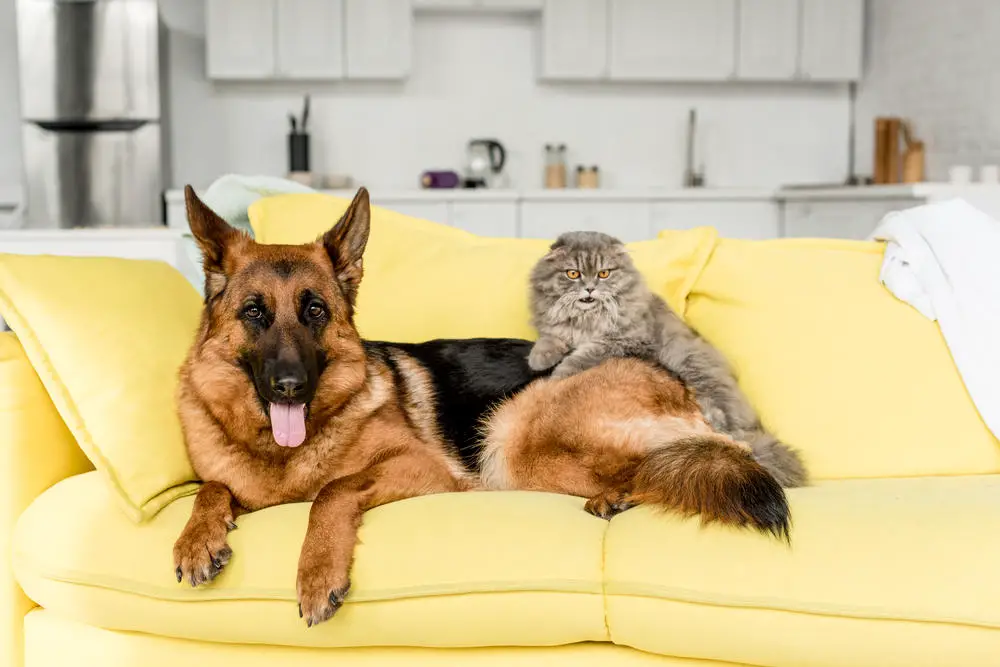
If you have a cute kitty at home and want to bring home a German Shepherd too because you simply love animals, the ideal scenario is if your pooch and cat get along famously. However, if they take an instant dislike to one another, you are bound to witness cat-dog fights that are sure to ruin the peace and quiet of your home.
The oft-asked question is, are German Shepherds good with cats? Well, the answer to that is that some German Shepherds may get along with cats naturally, while others may be aggressive towards them. German Shepherds are very intelligent dogs but they naturally have an instinct to chase their prey and usually view cats as targets.
German Shepherds and cats have natural instincts that clash and the size difference between the large dog and small cat can make it dangerous if they are not trained to get along. However, it is possible for German Shepherds to be good with cats and it is possible for both of them to get along harmoniously. This just takes some time, patience and effort.
Why Do German Shepherds Chase Cats?
If you ever wondered why German Shepherds love chasing cats, well the answer is very simple. German Shepherds are essentially working dogs and traditionally used by shepherds to help in herding flocks of sheep and keep them in line. The dogs run through the flock to make sure that no sheep are in danger and if any sheep steps out of line, they will nip at their ankles and get them back.
While German Shepherds may have become more adapted to urban lifestyles, they have not abandoned their herding instincts and a cat makes a great substitute for sheep. However, you can train your German Shepherd to ignore this cat chasing and harassing instincts by socializing him to be a good model pooch.
Dogs and Cats, Can They Get Along?
Well, this is a cliché and the cat-dog rivalry has existed since times immemorial. However, while a German Shepherd is big, he is quite intelligent and can be quite gentle and can extend this gentle behavior towards cats too.
However, to make sure that this happens and your German Shepherd does not bolt and chase your cat whenever he sees one, the key is to properly introduce and socialize your German Shepherd to behave around a cat can so that your pooch and kitty can get along well.
And, if you socialize your German Shepherd from when he is a puppy, he can get along very well not only with cats, but other dogs, animals and even strangers. But before you go on to getting your German Shepherd and cat together, it is very important to understand the various factors that can determine the time and training needed for both your pets to get along. The important factors are the personalities of both animals, how old the German Shepherd is when introduced to the cat and the dynamics of both animals.
Personality of the German Shepherd
The German Shepherd is a very intelligent herding dog and as mentioned earlier, has a natural instinct to chase, herd and protect. While your German Shepherd may not mean any harm and is just having fun, this can be quite scary for the cat that’s being chased. While the German Shepherd will not chase a cat every time he sees one, it is very important to understand that chasing is an inherent characteristic of this breed.
Personality of the Cat
Cats are reserved and cautious animals, especially when they are in new environments and new situations. While some cats may be quite bold, others are timid and shy. But in general, cats approach any new situation with wariness and when you introduce the German Shepherd to a cat, you must bear this in mind.
Age of the Dog and Cat
Compared to an adult dog, it is easier to introduce a puppy to a cat and there is a better chance of them getting along. If done properly, even adult German Shepherds that have been well socialized will not have any issues when you introduce a cat. Similarly, when you’re introducing your German Shepherd puppy to a kitten, there may be lesser chances of the cat being anxious or afraid of the puppy.
Related: Do German Shepherds Bark a Lot?
How to “Cat-Train” Your German Shepherd
While some dogs love to meet people and are extroverts, others are shy and like to keep to themselves. Some dogs have a natural tendency to get along with people and other animals, however, all dogs can be trained to tolerate people and other animals and this is known as “socializing.” The good news is that German Shepherds are typically easier to train than other dog breeds.
Socializing a German Shepherd is quite an intuitive process. Although they are intelligent and brave dogs, German Shepherds also get nervous around new people and the more time they spend getting to know people or doing a new activity, the less nervous and scared they will be. To socialize your German Shepherd effectively, you must get them around other animals, dogs, cats and people so that they can become familiar with them.
Most dogs are open to learning and socializing when they are very young, so make sure that you begin the process with your German Shepherd nice and early. You can begin socializing your German Shepherd puppy by feeding him and your cat close to each other. When feeding both animals together, it is a good idea to feed them on either side of a closed door. Seeing one another may alarm both animals; however, close proximity without seeing each other can help both to adjust to one another’s scent.
Before you introduce your German Shepherd puppy to your cat, make sure he understands and obeys 3 important commands i.e. ‘sit’, ‘stay’ and ‘leave it’. For a face-to-face interaction, knowing these 3 commands should be enough for your puppy. Keep the first interaction between your German Shepherd and your cat very brief. Keep the dog in his kennel and place the cat in front of him and let them interact with one another for around 5-10 minutes.
If the dog shows signs of aggression, say ‘no’ and if he still continues with his aggressive behavior, then take the cat and leave. Continue these interactions for a few minutes for 1-2 weeks and gradually increase the interaction time between both pets until they are able to spend at least half an hour with each other comfortably.
When you feel that your German Shepherd is ready, take him out from the kennel and put him on a leash and then let him interact with the cat. If he shows signs of aggressive behavior or does not obey your commands, repeat the process of removing the cat from the room. Let the interactions between both animals continue until they are peaceful.
Repeat the interaction process without the leash. However, ensure that you keep an eye on both pets. German Shepherds can be quite territorial and so it is a good idea that he has his own space. You could get a cat flap on a door and both your dog and cat can have their own spaces.
You must also remember that your German Shepherd puppy will grow to be a large dog, easily weighing more than 90 lb and can be a threat to your kitten even if he is playing and can be crushed if your German Shepherd lands on the cat.
If your German Shepherd is very high spirited, then you could send him to a training school to help with the socialization process. Apart from being an excellent way to socialize your dog effectively, a training school can help to teach your puppy basic commands.
Tips for Training Your German Shepherd
- If you’re adopting a German Shepherd, check if the dog is comfortable around cats. If yes, it is most likely that he will be well behaved around your cat.
- Before your German Shepherd puppy reaches puberty, neuter or spay the dog at around six months. This will help to significantly reduce the dominant behavior towards your cat.
- German Shepherds are very active and energetic and love to run around. Ensure that your pooch gets plenty of exercise and this way he is less likely to annoy and chase your cat.
- These dogs respond extremely well to positive reinforcement. So, be sure to praise them when they are well behaved and give them dog treats and hold back their rewards and treats when they are naughty and do something wrong.
The key to your German Shepherd being good with your cat is to be patient with both animals. The steps that you take to introduce and befriend your German Shepherd and your cat is sure to pay off in the long run. Be patient and wait until the tensions between both your pets are truly dispelled. Maintaining a positive attitude and handling the introductions patiently will help both your pets to learn to accept one another and they may even become BFFs.

